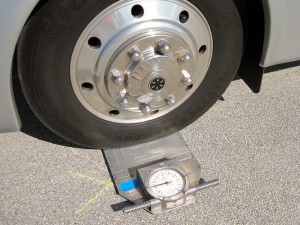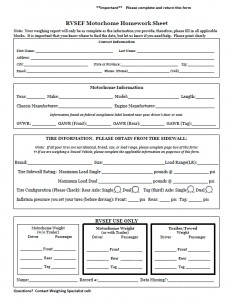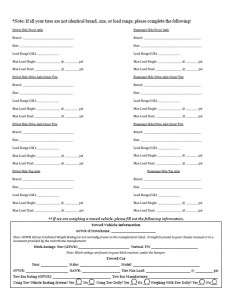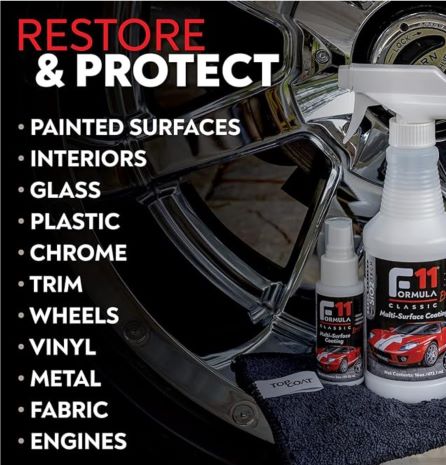Traveling in an RV is one of the greatest ways to get out and visit great places. No matter where you are you always have your home with you! For full time RVers, this is especially true! However, one thing I have observed in our seven years of full time RV living is that some people tend to forget about safety. I would like to suggest a few RV safety tips that may help the seasoned, as well as the occasional RV traveler.
Consider Weighing Your RV!
The first, and most important one I think is to know how much your RV weighs! If you have no idea what your fully loaded RV is carrying you should consider weighing your RV! The biggest argument I hear against taking the time to get this done is, “I still have more storage space so I must be okay!” That may be true, but it does not always work that way.
If you were to take a completely empty RV, look at the data plate that specifies the gross vehicle weight rating and subtract the weight of your empty RV, you would have your carrying capacity of the vehicle. Now depending on the class of RV you have there are several other factors to consider. But for this discussion lets keep it simple.
From there you would have to know how much water you want to carry and calculate that weight and add it to the vehicle’s empty weight. Then, you would have to weigh each individual item going into the RV and stop loading any more items when you reach the vehicle’s gross vehicle weight rating. But, how can you know that you have the vehicle loaded evenly?
What if you have not exceeded the RV’s gross vehicle weight rating but have more weight on one side of the RV than on the other? This condition might be overloading the tires and axles on one side and possibly create a situation where a tire failure could occur. Damage may also occur to the axles themselves if this condition continues for extended periods of travel.
When Pam and I bought another RV earlier this year I put weighing the RV on the top of the list of things I wanted to accomplish. Given it is a class C RV, and that we are pulling a cargo trailer with all our stuff, I knew that this RV would be easy to overload. Even in our 5th wheel we had to watch the carrying capacity very closely. All the appliances and three slides were on the street side of the RV and only one slide with very little weight in it was on the curb side. So, we had to put the heavier items on that side of the RV to balance out the carrying capacity of the RV.
Once we loaded our new RV we made it a point to find a service that could weigh our RV. These types of services can be found at RV Owner’s group rallies and RV shows. Now this is not like taking your RV to a Pilot / Flying J truck scale. That only tells you the total weight of a vehicle. What you need to know is how much weight is on each axle, and more important than that, each tire so that overloading can be avoided.
We started this weighing process by filling out a form that asked questions about the RV, axle ratings, tire type and weight ratings of those tires. Once the RV was weighed at each tire, and including our trailer, a report was generated to determine where we were at with our loaded RV.
We found out that our vehicle was slightly overweight on the rear axle and slightly underweight in the front axle. This included the weight of our trailer on the hitch of the RV. Also, the trailer was slightly underweight and the cargo weighted evenly on each side of the trailer. So, our major concern was the rear axle of the RV under its current load. But, according to the folks that weighed the RV, as long as we keep the tires at the correct cold pressure values and don’t exceed 65mph, we are well within acceptable limits.
Given that Pam and I are never in a hurry when we travel, and maintain our speed between 60 – 65mph, we are good to go. I will also add that as we continue to live the full time RV lifestyle we will continue to get rid of things we don’t use. That will help us to continue to lighten the load!
I would like to comment on one more RV safety tip. Please be sure that when you are traveling in your RV that you have your propane system turned off! In the event that something should happen on the road: a tire blowout, hitting a road alligator (road debris), or some other unforeseen circumstance, you don’t want to have your energized propane system create a catastrophic event when the system is damaged during travel!
Most people travel with their propane tanks on in order to keep their propane refrigerator cold. The truth is that if you do not open the refrigerator during travel it will remain at acceptable temperature levels.
If you have a motorized unit you can use your generator and switch over to electric cooling to keep it cool. If you don’t have that option you can put a small block of ice in the fridge to help with cooling. Pam and I have used both methods successfully in order to travel safely when it comes to avoiding the use of propane to run the refrigerator.
I hope both these RV safety tips will help you to continue to enjoy safe RV travel!
Happy Travels!!
Howard, Pam and Lindsey












Recent Comments